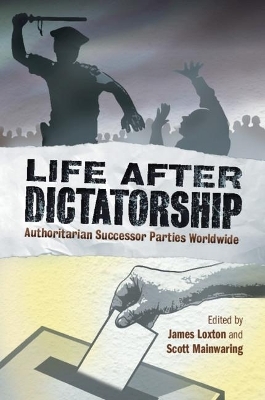
Life after Dictatorship
Cambridge University Press (Verlag)
978-1-108-44541-2 (ISBN)
Life after Dictatorship launches a new research agenda on authoritarian successor parties worldwide. Authoritarian successor parties are parties that emerge from authoritarian regimes, but that operate after a transition to democracy. They are one of the most common but overlooked features of the global democratic landscape. They are major actors in Africa, Asia, Europe, and Latin America, and they have been voted back into office in over one-half of all third-wave democracies. This book presents a new set of terms, definitions, and research questions designed to travel across regions, and presents new data on these parties' prevalence and frequent return to power. With chapters from leading Africanists, Asianists, Europeanists, and Latin Americanists, it asks: why are authoritarian successor parties so common? Why are some more successful than others? And in what ways can they harm - or help - democracy?
James Loxton is a Lecturer in Comparative Politics in the Department of Government and International Relations at the University of Sydney. His research interests include authoritarian regimes, democratization, and political parties. He is the co-editor (with Steven Levitsky, Brandon Van Dyck, and Jorge I. Domínguez) of Challenges of Party-Building in Latin America (Cambridge, 2016). He is currently writing a book on conservative party-building in Latin America. He holds a Ph.D. in Government from Harvard University. Scott Mainwaring is the Jorge Paulo Lemann Professor for Brazil Studies at the Harvard Kennedy School. His research interests include political parties and party systems, democratic and authoritarian regimes, and political institutions in Latin America. Among his many books is the award-winning Democracies and Dictatorships in Latin America: Emergence, Survival, and Fall (with Aníbal Pérez-Liñán, Cambridge, 2014). He was elected to the American Academy of Arts and Sciences in 2010. His edited book, Party Systems in Latin America: Institutionalization, Decay, and Collapse (Cambridge) was published in 2018. From 1983 until 2016, he taught at the University of Notre Dame.
Preface James Loxton and Scott Mainwaring; Introduction: authoritarian successor Parties Worldwide James Loxton; Part I. Why Do Authoritarian Successor Parties Exist (and Often Wins Elections)?: 1. Linkage strategies of authoritarian successor parties Herbet Kitschelt and Matthew Singer; 2. Authoritarian successor parties in South Korea and Taiwan: authoritarian inheritance, organizational adaptation, and issue management T. J. Cheng and Teh-fu Huang; 3. Personalistic authoritarian successor parties in Latin America James Loxton and Steven Levitsky; Part II. What Explains Variation in Authoritarian Successor Party Performane?: 4. Victims of their own success: the paradoxical fate of the communist successor parties Anna Grzymala-Busse; 5. Authoritarian successor parties in Sub-Saharan Africa: into the wilderness and back again? Rachel Beatty Riedl; 6. The survival of authoritarian successor parties in Africa: organizational legacies or competitive landscapes? Adrienne LaBas; 7. The contrasting trajectories of Brazil's two authoritarian successor parties Timothy J. Power; Part III. What are the Effects of Authoritarian Successor Parties on Democracy?: 8. Mexico's PRI: the resilience of an authoritarian successor party and its consequences for democracy Gustavo A. Flores-Macias; 9. Game for democracy: authoritarian successor parties in developmental Asia Dan Slater and Joseph Wong; 10. Reluctant democrats: old regime conservative parties in democracy's first wave in Europe Daniel Ziblatt; Conclusion: life after democracy James Loxton.
| Erscheinungsdatum | 03.10.2018 |
|---|---|
| Zusatzinfo | Worked examples or Exercises; 30 Line drawings, black and white |
| Verlagsort | Cambridge |
| Sprache | englisch |
| Maße | 151 x 228 mm |
| Gewicht | 640 g |
| Themenwelt | Sozialwissenschaften ► Politik / Verwaltung ► Politische Systeme |
| Sozialwissenschaften ► Politik / Verwaltung ► Vergleichende Politikwissenschaften | |
| ISBN-10 | 1-108-44541-1 / 1108445411 |
| ISBN-13 | 978-1-108-44541-2 / 9781108445412 |
| Zustand | Neuware |
| Haben Sie eine Frage zum Produkt? |
aus dem Bereich


